- Home
- A. J. Hartley
On the Fifth Day Page 2
On the Fifth Day Read online
Page 2
"Oh, this is going to be fun," he said aloud. For several minutes he just sat there and looked at the glass, musing: no wrestling with eternal verities, no despair, no angst-ridden consideration of what yet might be. The deci
sion, he thought, would be driven by a whim, like choosing which coat to wear in uncertain weather.
9
O n t h e F i f t h D a y
That's not really good enough, is it? And besides, it's bound to look like a response to losing your job. Worse, it will look like a "gesture."
"God," he said, "not that. Anything but that."
He picked up the glass of pills and rattled it, putting it down slowly but with conviction. No cheap melodrama for him, not tonight anyway, even if he had no conceivable reason to get up in the morning.
At that he began to laugh quietly to himself. Then he set his teeth, splashed water on his face at the kitchen sink, and tipped the pills into the garbage disposal. Only after the ma
chine's deafening crunch had turned into the familiar whine that said the contents had been ground to nothing and flushed away did he think that he would probably want some of them in the morning.
He stayed in the house all the next day reading distractedly from Paradise Lost because he found the rhythm of the lines familiar, even comforting. He had no time for Milton's God these days--or anyone else's for that matter--but rereading the poem took him back to his high school years, removed the sense of accumulated failure. The following day he watched a pair of bad movies on TV and went out to a steakhouse, re
turning home to drink because it was cheaper and less humili
ating than sitting alone in a bar. And he ran, of course, punishing his body for the inadequacies of what Peter the Principal called his "character."
He was thirty-seven, though he felt older, a large, rangy man with untidy limbs and a ponderous way of moving. His ex-wife had called him by every animal name she could think of, sometimes affectionately, particularly those clumsy, un
dramatic zoo beasts that most people skipped to get to the big cats: bulls and camels, water buffalos and rhinos. And mules, he thought. Don't forget mules. Because it wasn't just about his body and how he used it. It was also his temperament. There was nothing mulish about his 10
A. J. Hartley
mind. Kumi had been fond of saying he was too clever for his own good, in fact. But he had a stubborn streak, a dull-edged defiance that could turn belligerent if sufficiently goaded, and, if he was going to be really honest about it, a distinctly mulish insensitivity where other people's priorities were concerned. Not surprisingly, perhaps, he had lived by himself for the last six years, long enough to be almost used to it. In that six years he had woken up alone every single morning so that it had come to feel quite normal, and not because he had never had the opportunity to take someone to bed with him. All drunken melodrama aside, he told himself, he was comfort
able alone.
Which is handy, because no one can put up with you for long . . .
Another of those bleak, self-deprecating smiles that were becoming his habitual expression.
The house was dark and cold and it occurred to him that he should start economizing as far as heating the place was con
cerned, so he stacked a couple of logs on the fire and poured himself another shot of the Cluny, which he warmed in his hands till the vapors made his nostrils tingle. His mind was still replaying the interview with which his career had ended.
"When you first came here," the principal had said, "we thought we'd hit the jackpot. The kids loved you. The parents loved you. The school board, hell, even the media loved you. Your students were acing tests and winning scholarships and starting their own reading and writing clubs. Their own clubs!
It was amazing. You were always opinionated, but you were also principled, hardworking, and--frankly--the best teacher I'd ever seen."
Thomas nodded, smiling softly, remembering as if it had all happened to someone else. Of course, that was not how the conversation had concluded.
"But five years or so ago," Peter had continued, "it all started falling apart. All of it. Now . . . I don't know. It's not your damned causes or your bluster, Thomas. You complain 11
O n t h e F i f t h D a y
about all these . . . these issues, but at bottom I'm not con
vinced you really care about any of them."
Thomas sat there as he had sat in front of the principal, still no nearer an answer. In the end he had said, "I don't know how to fix it. It's who I am, I guess. It's what I do."
To which Peter had replied with a finality that was the day's only real surprise:
"Not anymore, Thomas. Not here."
And so it had ended.
When the phone rang Thomas was barely conscious and his first response was to ignore it.
Probably Peter, calling to explain the pressure he was un
der, hoping that Thomas wouldn't hold it against him. Peter the Principal was not, after all, a bad guy.
No sir. Peter's an upstanding citizen, a prince among men. Thomas moved to the phone slowly and stood for a second looking at it, thinking of nothing, feeling only a blankness and a dull exhaustion. He picked it up to stop its ringing and, he supposed, to bring about some kind of closure. If he left it to the machine he'd have to listen to Peter's earnest apologies here in the dark and then again when he inevitably called back and Thomas could dodge him no longer.
"Yes," he said.
"Could I speak to Thomas Knight, please?"
It was a man, but not Peter, and the voice was oddly formal. The press?
"You could," he said, "but he's currently engaged with a bottle of whisky. I'm surprised he's still newsworthy. I mean, it's been a good ten minutes since he was fired." A Hamletic exaggeration, he thought, dignifying what was ob
viously a pretty sophomoric jibe. "Or is this the human in
terest follow-up?"
There was a fractional pause. The voice when it returned was careful, even grave.
"I'm sorry? I'm looking for Thomas Knight, brother to Fa
ther Edward Knight."
12
A. J. Hartley
And then the room began to spin a little, his elder brother's name jarring him with its unfamiliarity.
"Speaking," he said again, needlessly adding, "this is Ed Knight's brother."
"My name is Father Frank Harmon. I'm the provincial su
perior for the Society of Jesus here in Chicago."
Thomas nodded and then forced himself to say, "Yeah?"
There was a hint of something sardonic, an old bitterness that he couldn't quite suppress when dealing with officials of the Catholic church, a bitterness that surfaced even through the dread he felt gathering like fog.
"I'm afraid I have some bad news for you," said the voice. CHAPTER 2
The taxi seats were hard and cold, but his ancient Volvo, after two days of sitting idle in the snow, had refused to show any sign of life. Watching from the backseat as Oak Park's gridplan streets unfolded around him, the driver beyond the Per
spex screen making Hindi chitchat into his radio, it felt to Thomas a little like he had been arrested. There were still a couple of inches of snow on the ground, but the potholed roads and driveways were clear so that the overall impression was one of a job only half done. The single-family homes spread on, their little differences somehow reinforcing their uniformity. The rectory, if that was the word, was different in form, but not in kind.
It was attached to a dilapidated brick church, smaller than Thomas remembered and badly in need of maintenance; the roof was patched, the walls stained and crumbling, the blue gloss trim peeling and rotten. St. Anthony's Parish Church said the sign, its gilt lettering cracking. Thomas would bet good money that the place was only a quarter full on Sundays 13
O n t h e F i f t h D a y
and a good deal less than that the rest of the week. It was a church like the one he had grown up attending, a building tha
t was somehow fading, part of a bygone world. Not old enough to be quaint, not grand enough to inspire awe, a building con
structed on the expectation of plenty, now obscure, its foothold in relevance slipping further by the day . . . Give it a rest.
Thomas shrugged the mood off, set down the empty suit
case he had brought to collect Ed's things, and pushed the doorbell. It rang, a thin, monotonous jangle in the distance. Then nothing but the cold wind. Thomas hugged his jacket to himself ruefully. He considered the discolored white Honda on the drive. It was old enough to still have those square an
gles, and the body work was half eaten away by the Chicago cold and--probably worse--the salt they put on the road. The door opened and a man appeared, one hand clutching a half-eaten sandwich. He was perhaps fifty, thin, balding and chewing. He gestured with the sandwich and stepped aside, allowing Thomas in. As the door banged shut behind them, the biting wind abated, but the hallway was not significantly warmer. It was also dark and smelled of damp and mildew.
"Cup of tea?" said the man, through his sandwich, walking quickly along the corridor.
"Er . . . sure," said Thomas. He entered the thin man's slip
stream and hurried after him, catching the thick tang of peanut butter in his wake.
"Cold one today, huh?" said the man as they emerged in a stark and faded kitchen.
"It'll get worse before it gets better," said Thomas.
"I'll give you something for now and see if I can call a shelter," said the other, rooting through an uneven stack of pa
pers. The room seemed to double as kitchen and office, both inadequate. "But they get pretty short on beds this time of year," he said, not looking up.
"I'm sorry," said Thomas, "my name is Thomas Knight."
"Jim," said the other, looking up and giving him a nod. He sounded Irish or maybe Scottish. He continued to thumb 14
A. J. Hartley
through the papers, scattering the ones he decided were of no use, his eyes tightly focused.
"Ed Knight was my brother," said Thomas.
It took perhaps half a second, and then the man who had called himself Jim froze midshuffle, straightened slowly, and gave a long, vocalized sigh, part realization, part selfdeprecation.
"Right," he said. "Sorry. I thought . . ."
"You thought I was homeless," said Thomas, finding--to his surprise--that he was smiling.
"It's the suitcase," said Jim, nodding to Thomas's battered luggage. "And the force of habit."
"It's no problem," said Thomas, thinking that in other cir
cumstances, he might have taken the other man for homeless too. "Better icebreaker than most. And you are . . . ?"
"Jim," said Jim. "Sorry, I thought I said."
"You did," said Thomas. "I mean, you're the housekeeper or the gardener or . . . ?"
"Have you seen the garden? There's no bloody gardener here, I'll tell you that. No. I'm the parish priest. Father Jim Gornall. Pleased to meet you. Your brother was sent by the Js to help out here. He was a good man."
A good man. He didn't emphasize good, as if he were making a statement on Ed's piety or moral standing. He said it as a soldier would of a fallen comrade.
Thomas hesitated a fraction too long, processing the idea that this disheveled and ungainly Irishman was a priest, and Jim shrugged without embarrassment or indignation. He didn't care, and Thomas immediately warmed to him.
"You still want tea?" said Jim.
"That would be great."
"More force of habit," said the Irishman. "When in need of warmth, welcome, or consolation, tea is generally the first line of attack."
"Unless you can get to the whisky first."
"Exactly," said the priest with a sudden grin that lit his 15
O n t h e F i f t h D a y
whole face. "The obligatory Catholic vice. You fancy a small one?"
"Bit early for me," said Thomas, adding almost apologeti
cally as the lie struck him and registered, "not today."
"Fair enough," said the priest. "Then tea it is."
They drank from heavy mugs, chipped but clean, on either side of an inadequate electric heater that was turned to its low
est setting.
"Completely bloody useless," said the priest, "but if I turn it up any higher it blows every light in the building."
Thomas grinned.
"So what's a genuine Irish priest doing in Chicago?"
"Priest shortage," said the priest. "I fancied coming to America, so I applied to seminary here rather than at home. That was a long time ago. I think of myself as a kind of mis
sionary," he said, grinning again.
"Don't you think America has enough religion?" said Thomas, his gaze level.
"That's why they need a missionary," said Jim.
"I don't think I follow," said Thomas.
"Forget it," said the other, shrugging it off. "Private joke. You look familiar. Have we met before?"
"I don't think so. People say I look like Ed."
"Maybe that's it. So when do you want to start going through Ed's stuff?" said the priest. "It won't take long. There isn't much."
"What about . . . wherever he died?" said Thomas. "They didn't tell me. They said he was overseas, but they didn't say where." He paused, and the silence seemed long and loaded.
"I suppose I should have asked," he added lamely. The priest made a face.
"He wouldn't have had much with him," he said. "Nothing beyond a suitcase or two. His worldly goods, such as they are, are here, and whatever you don't claim will go to the order."
"So what was he doing?" said Thomas. "He wasn't a mis
sionary, right?"
16
A. J. Hartley
"No," said Jim. "Unlike me. He had been based here for a few months. I'm a diocesan priest. He was a Jesuit--a mem
ber of the Society of Jesus. He was sort of on loan to me here for a while, helping me out. When things calmed down, he went on retreat. I expected him back for a little while, but he would probably have been moved again by the end of the year. There was talk of him teaching at Loyola."
Thomas nodded, but there was something in the priest's manner he found careful, even evasive despite his breezy man
ner. He was intellectually agile, somehow, this priest, and if his scattered and disheveled appearance wasn't actually an act, it was certainly misleading.
"So. Ed's stuff," said Thomas. "I just take what I want and toss the rest away?" It seemed wrong, disrespectful.
"You're not so much an inheritor as an executor, as I un
derstand it," said the priest. "The Js take a vow of poverty, so he doesn't really own property as you or I do. They are going to send a lawyer round to help out. Technically everything be
longs to the order, though I'm sure they will respect your wishes if there are personal things you want to keep."
"I shouldn't think there will be," said Thomas, more brusque than he had meant to be. The priest nodded and Thomas looked away. He didn't want to get into a conversation about why he had so utterly lost touch with his only brother.
"Then it will be a short visit," said the priest, sipping his tea and watching Thomas over the rim of his mug. "But you can stay the night, if you like."
"That won't be necessary," said Thomas. "I live locally."
"What's 'necessary'?" Jim shrugged. "I could use the company."
Thomas thought quickly. It was not as if he had anything to rush home to, and odd though it seemed, there was suddenly something appealing about being in his brother's space, in what had been his life, if only for a moment.
"Okay," he said. "Thanks."
"You can take Ed's room," said the priest. "Top of the stairs on the left. Illinois game tonight. You a basketball fan?"
17
O n t h e F i f t h D a y
"Not really."
"Perfect," said Jim. "Me neither. We can get a pizza, a cou
ple of bee
rs and watch freakishly tall people running around for no good reason."
The sheer ordinariness of the generosity took Thomas off guard, so it was a moment before his pleasure and gratitude could make its way into his face and voice.
"That would be great," he said. "Can I go on up?"
"Sure. I'll leave you to it, if you don't mind," said the priest. "I have a spiritual direction meeting."
Thomas laughed. "Sounds like something I could use," he said as he made for the stairs, avoiding the priest's gaze. CHAPTER 3
Ed's was a sad little room. The minimal furniture was cheap, old, and stained with years of use. Apart from a meager selec
tion of clothes there were only books, papers, an overstuffed manila folder bound with rubber bands, an ancient transistor radio, and a couple of shoeboxes of oddments, all stacked haphazardly on a set of shelves made of planks and cinder blocks. The place looked less like the home of a priest than it did a dorm room that had been hurriedly vacated. A crucifix hung on the wall, but the place was otherwise unadorned ex
cept for an Amnesty International calendar. As Jim had said, there was nothing here, certainly nothing of value. Thomas's trip--save the pizza and basketball part--was likely to be done within the hour. If he'd known, he wouldn't have both
ered coming. Now he had to kill time before the lawyer ar
rived with the paperwork.
He sat on the bed. The mattress was thin and uneven, the springs pressing insistently through.
God, what a place.
18
A. J. Hartley
It felt empty, joyless: not unlike his own house, Thomas thought wryly. This was what Ed had chosen, what he had dedicated himself to, sacrificing God-alone-knew-what for this blank little cell with its cheap crucifix for company. Thomas had found a certain comfort in calling Ed's life an escape, a way of dodging the soul-killing business of every
day life, but sitting here now he had to admit that if his brother had thought in those terms he had been sadly de

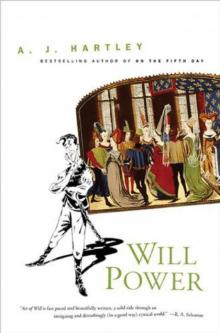 Will Power wh-2
Will Power wh-2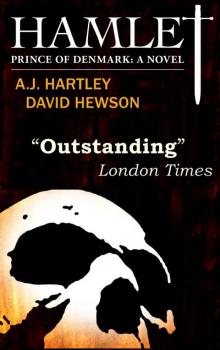 Hamlet, Prince of Denmark
Hamlet, Prince of Denmark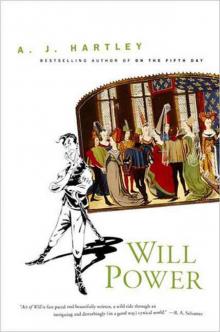 Will Power
Will Power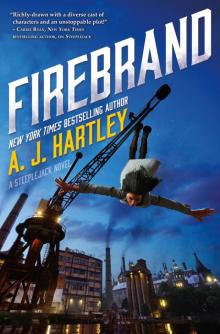 Firebrand
Firebrand A Novel
A Novel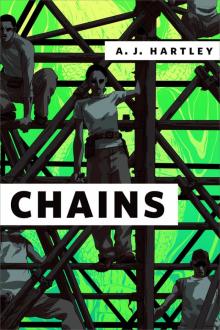 Chains
Chains Guardian
Guardian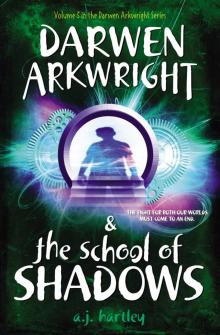 Darwen Arkwright and the School of Shadows
Darwen Arkwright and the School of Shadows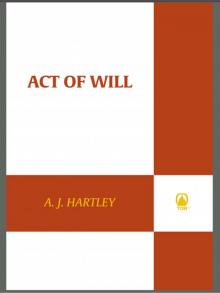 Act of Will
Act of Will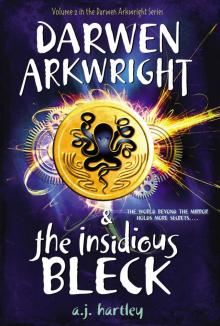 Darwen Arkwright and the Insidious Bleck
Darwen Arkwright and the Insidious Bleck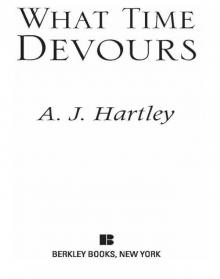 What Time Devours
What Time Devours